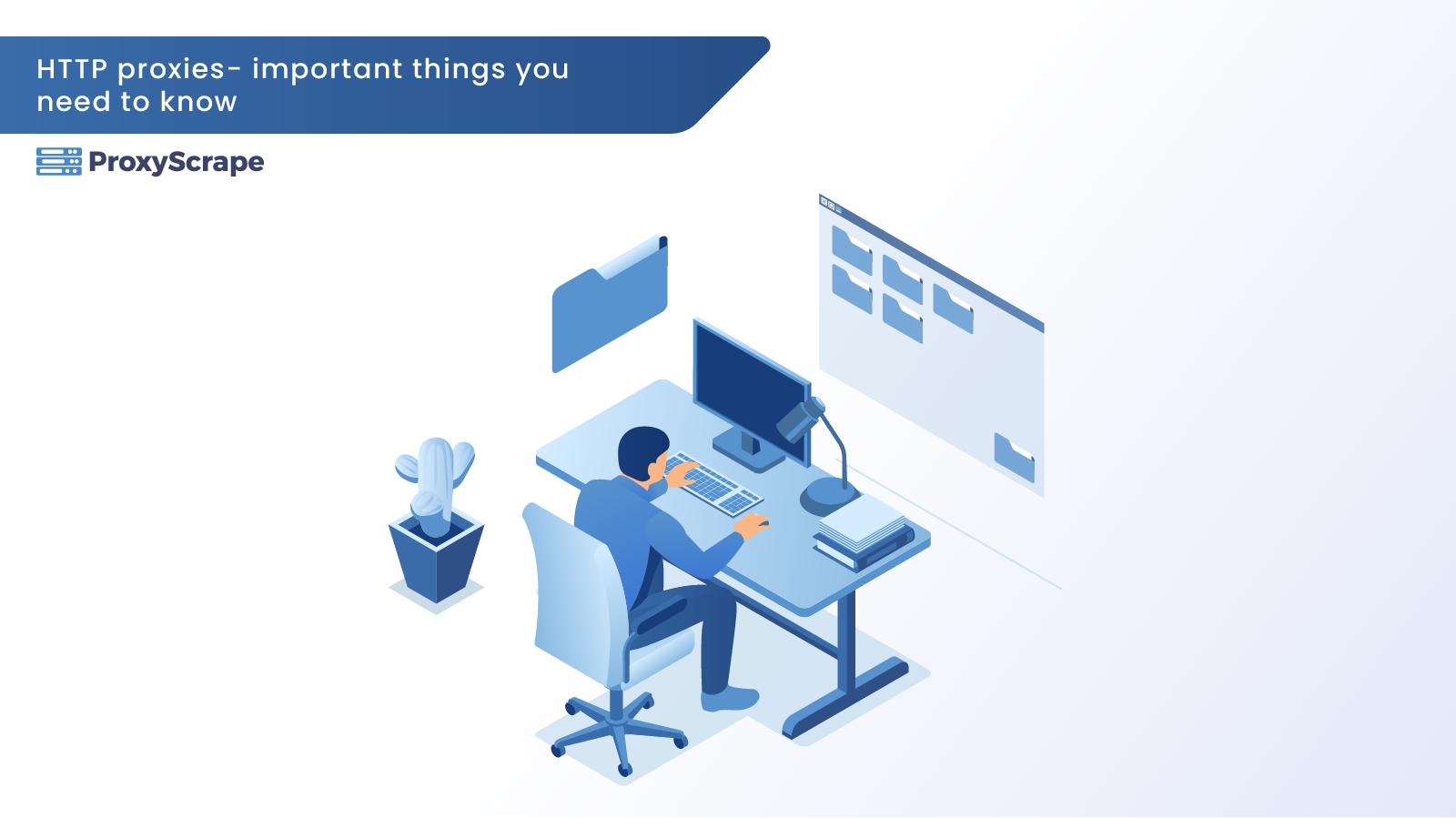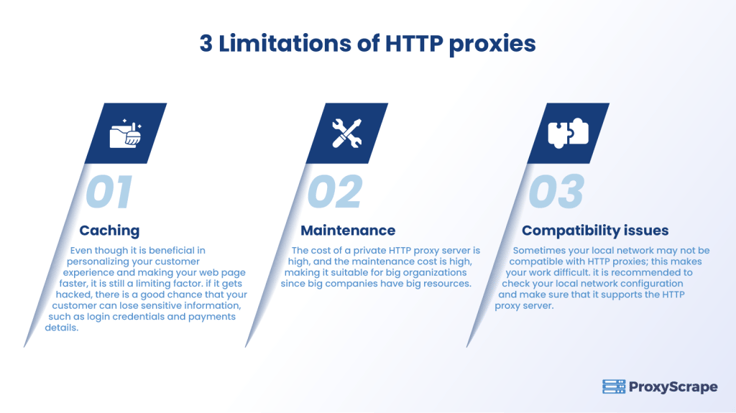HTTP Proxies – Important Things You Need to Know in 2026

Nowadays, you can get mountains of information online with the help of a single click. You have to type out your request, and the Internet will give you the answers. But have you ever thought about how you are getting the information you need? The answer is based on the data transfer between your device
Nowadays, you can get mountains of information online with the help of a single click. You have to type out your request, and the Internet will give you the answers. But have you ever thought about how you are getting the information you need? The answer is based on the data transfer between your device and the target server. This is true, but there is much more than that. You might have heard “IP,” an abbreviation for Internet Protocol. IP plays a significant role in transferring and exchanging data online to get the results for your requests.
So, what is an IP? In the upcoming block, we will discuss IP addresses and how you can avoid most of the internet security filters with the help of “HTTP proxies.”
Feel free to jump to any sections to learn more about HTTP proxies!
The Function of an IP Address:
HTTP Proxies – How Do They Work?
The Benefits and Limitations of HTTP Proxies:
Which Is the Best HTTP Proxy Online?
An IP Address – What Is It?
In simple terms, an IP is a protocol, or guideline, that helps send and receive data online between two or more computers. These IPs are identified as IP addresses and are unique to every device online to differentiate them easily. These IP addresses are responsible for carrying your request to the target server and getting the best response possible.
Generally, it helps to carry your requests and send them to the target server, but how does it work?
The Function of an IP Address:
The whole request will not reach the target server directly when you send the request. At first, your request will be divided into chunks of information called “data packets.” These packets contain your information (the sender’s information) and the receiver’s information. These packets take different routes in order to reach the destination (the target server). It arrives at the destination in random order. The IP has now done its work, delivering all the information from the user. In order to put the information in the correct order, another protocol is used, which is TCP (Transmission Control Protocol)
Now you know how an IP address works. When you give your request, your IP address carries it and delivers it to the target server to get the result for your request. But what happens when the target server denies your request?
The solution is “HTTP proxies.”
What Is a Proxy Server?
A proxy server is an intermediary server that sits between you (the client) and the target server (online). Your IP address is responsible for delivering your requests to the target server. Once it reaches the server, the target server responds.
Governments and content owners have imposed restrictions on the content that is distributed and displayed around the world. They have every right to restrict their content in certain regions. So, how do you access this “geo-restricted” content?
The solution is a “proxy server.” A proxy server helps you to reroute your internet traffic through its server and deliver it to the target server. This rerouting process allows you to mask your original IP address and browse online anonymously.
When you integrate a proxy with your device, your original IP address provided by your ISP (Internet Service Provider) is masked with the proxy server’s IP address. This way, the target server will have difficulty identifying your physical location. You can leverage this in order to access geo-restricted content without any problems.
HTTP – What Is It?
HTTP stands for Hypertext Transfer Protocol, an application-level protocol responsible for transmitting and exchanging computer files on the Internet. When you take any URL (Uniform Resource Locator), the first part of the URL will be “HTTP.” This is designed so that websites are faster and more efficient.
The objective of HTTP is to communicate with online web servers. Did you know? At first (HTTP v1) executed each client-server independently, meaning that when a single transaction is completed, the connection between the browser and the target server will be terminated. HTTP does not inherently have security factors.
HTTP Proxies – How Do They Work?
An HTTP proxy is a proxy server mainly for high-performance content on the Internet traffic received by HTTP clients and servers. The functionality of HTTP proxies remains the same as the standard proxies.
The implementation of HTTP proxies is different. The function is simple. HTTP proxies are being used to monitor the traffic between the servers in order to eliminate any form of harm that can be done to the website. This helps to identify any malicious activity and blocks them, making it one of the best tools for filtering out malicious activities.
You can customize the proxy settings based on your requirements and create unique rules to block any malicious activity on your site.
The Benefits and Limitations of HTTP Proxies:
HTTP proxies are mostly preferred at an enterprise level because of their security filter feature, apart from HTTP proxies used for various security purposes. The main reason is that most web servers on the Internet work based on HTTP. Second, HTTPs’ is much faster, and last but not least, for visitors, it helps them surf online anonymously by hiding their IP address. HTTP proxies help to save Internet bandwidth by caching computer files and web pages. This also helps reduce the number of unwanted ads customers receive when they visit a web page.
But, where there are benefits, there are also limitations. The most limiting factors are:

- Caching – Even though it is beneficial in personalizing your customer experience and making your web page faster, it is still a limiting factor. If it gets hacked, there is a good chance that your customer can lose sensitive information, such as login credentials and payment details.
- Maintenance – The cost of a private HTTP proxy server is high, and the maintenance cost is high, making it suitable for big organizations since big companies have big resources.
- Compatibility Issues – This is not a frequent issue, but it is there. Sometimes your local network may not be compatible with HTTP proxies; this makes your work difficult. It is recommended to check your local network configuration and make sure that it supports the HTTP proxy server.
Which Is the Best HTTP Proxy Online?
ProxyScrape is one of the most popular and reliable proxy providers online. Three proxy services include dedicated datacentre proxy servers, residential proxy servers, and premium proxy servers. So, what is the best possible solution for the best HTTP proxy? Before answering that questions, it is best to see the features of each proxy server.
A dedicated datacenter proxy is best suited for high-speed online tasks, such as streaming large amounts of data (in terms of size) from various servers for analysis purposes. It is one of the main reasons organizations choose dedicated proxies for transmitting large amounts of data in a short amount of time.
A dedicated datacenter proxy has several features, such as unlimited bandwidth and concurrent connections, dedicated HTTP proxies for easy communication, and IP authentication for more security. With 99.9% uptime, you can rest assured that the dedicated datacenter will always work during any session. Last but not least, ProxyScrape provides excellent customer service and will help you to resolve your issue within 24-48 business hours.
Next is a residential proxy. Residential is a go-to proxy for every general consumer. The main reason is that the IP address of a residential proxy resembles the IP address provided by ISP. This means getting permission from the target server to access its data will be easier than usual.
The other feature of ProxyScrape’s residential proxy is a rotating feature. A rotating proxy helps you avoid a permanent ban on your account because your residential proxy dynamically changes your IP address, making it difficult for the target server to check whether you are using a proxy.
Apart from that, the other features of a residential proxy are: unlimited bandwidth, along with concurrent connection, dedicated HTTP/s proxies, proxies at any time session because of 7 million plus proxies in the proxy pool, username and password authentication for more security, and last but not least, the ability to change the country server. You can select your desired server by appending the country code to the username authentication.
The last one is the premium proxy. Premium proxies are the same as dedicated datacenter proxies. The functionality remains the same. The main difference is accessibility. In premium proxies, the proxy list (the list that contains proxies) is made available to every user on ProxyScrape’s network. That is why premium proxies cost less than dedicated datacenter proxies.
So, what is the best possible solution for the best HTTP proxies? The answer would be “residential proxy.” The reason is simple. As said above, the residential proxy is a rotating proxy, meaning that your IP address would be dynamically changed over a period of time which can be helpful to trick the server by sending a lot of requests within a small time frame without getting an IP block.
Next, the best thing would be to change the proxy server based on the country. You have to append the country ISO_CODE at the end of the IP authentication or username and password authentication.
FAQs:
FAQs:
1. What are HTTP proxies?
2. Are HTTP proxies safe?
3. What is a proxy server?
Conclusion:
Cyberattacks are increasing day by day. Many people and organizations lose a lot of resources and sensitive information to cyber hackers. Even though there is no perfect solution to fight against cyber attacks, it is necessary to take security measures. HTTP proxies are a significant first step to fighting against cyber attacks. HTTP proxy servers empower organizations to protect users and customers from malicious attacks. ProxyScrape does provide excellent reliable HTTP proxies for all uses with features, such as SSL, IP authentication, and rotating components, which can be a perfect tool for preventing cyber attacks. This article hopes to have given all the necessary information you need to know about HTTP proxies.